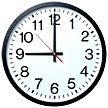To Your Health
April, 2007 (Vol. 01, Issue 04) |
|
|
To receive the best care and guidance for your individual needs, seek the advice of your health care professional. Your doctor's sure and certain guidance will help you sift through all of the hype - diet after diet, magic pill after magic pill, potion after potion - thrown at you from your neighbors, the tabloids, television and the Web.
Your doctor should encourage you to start with principles that have stood the test of time. Keep it simple because it
is simple; otherwise, we wouldn't be here.
Nutrition Essentials
Before, During and After Exercise
While your body's nutritional demands can vary considerably, depending on the sport you're involved in, not to mention the level at which you're performing (professional, amateur, weekend warrior, etc.), all athletes can benefit from keeping a few basic nutritional considerations in mind. The world-renowned Mayo Clinic offers the following tips for maximizing athletic performance:
 1 How often to eat: Skipping a meal can cause low blood sugar, which can make you feel weak and lightheaded. If you can't eat a true "meal" before working out, and your choice is candy or nothing, eat the candy - believe it or not, from an energy perspective, it's better than eating nothing. Just remember that candy is high in sugar and low on nutrients; eating yogurt or a banana will provide more lasting energy and better overall nutrition.
1 How often to eat: Skipping a meal can cause low blood sugar, which can make you feel weak and lightheaded. If you can't eat a true "meal" before working out, and your choice is candy or nothing, eat the candy - believe it or not, from an energy perspective, it's better than eating nothing. Just remember that candy is high in sugar and low on nutrients; eating yogurt or a banana will provide more lasting energy and better overall nutrition.
 2 When to eat: Exercising immediately after a large meal may make you feel sluggish or lead to an upset stomach, cramping or diarrhea. Why? Because your muscles are competing with your digestive system for energy. To avoid these complications, eat a large meal at least three to four hours before exercising, or a small meal two to three hours before exercising.
2 When to eat: Exercising immediately after a large meal may make you feel sluggish or lead to an upset stomach, cramping or diarrhea. Why? Because your muscles are competing with your digestive system for energy. To avoid these complications, eat a large meal at least three to four hours before exercising, or a small meal two to three hours before exercising.
 3 What to eat: Carbohydrates are your primary source of fuel. Cereals, breads, pastas, rice and fruit will give you the energy you need to exercise. Within two hours of finishing your workout, eat a meal that contains carbohydrates and protein, to help your muscles recover. Fats also provide fuel; however, they remain in your stomach longer, which can make you feel full during your workout.
3 What to eat: Carbohydrates are your primary source of fuel. Cereals, breads, pastas, rice and fruit will give you the energy you need to exercise. Within two hours of finishing your workout, eat a meal that contains carbohydrates and protein, to help your muscles recover. Fats also provide fuel; however, they remain in your stomach longer, which can make you feel full during your workout.
 4 The water factor: During exercise, your body produces heat, which leaves your body as you sweat, taking valuable electrolytes - potassium, sodium, chlorine, etc. - with it. Having an adequate water supply allows you to sustain your workout while avoiding dehydration. How much should you drink? When exercising, drink at least one glass before your workout, one glass every 10-15 minutes during your workout, and at least one glass after your workout.
4 The water factor: During exercise, your body produces heat, which leaves your body as you sweat, taking valuable electrolytes - potassium, sodium, chlorine, etc. - with it. Having an adequate water supply allows you to sustain your workout while avoiding dehydration. How much should you drink? When exercising, drink at least one glass before your workout, one glass every 10-15 minutes during your workout, and at least one glass after your workout.
Michael Dobbins, DC, maintains a thriving clinical practice in the San Francisco Bay area. He is an internationally renowned lecturer in the field of clinical nutrition and herbal therapy.

